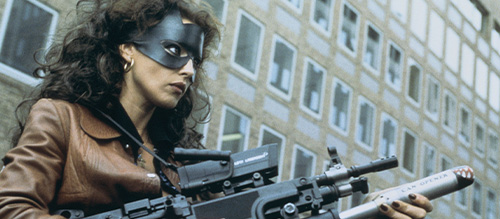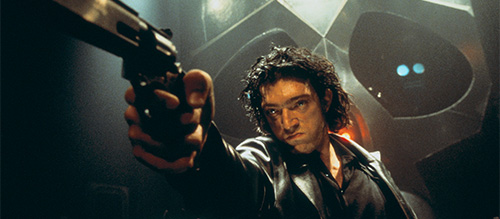Dobermann (1997) Review
Dobermann (1997)
Director: Jan Kounen
Screenwriters: Frederique Dumas, Eric Neve
Starring: Vincent Cassel, Monica Bellucci, Tcheky Karyo, Antoine Basler
The 1980s and 90s brought extremity in cinematic sex and violence to another level thanks to home video, premium cable channels, and decreasing self-censorship in the film industry. Brian De Palma, Quentin Tarantino, Takashi Miike, and directors like them, made movies that were equal parts entertaining, stylistic, and profane. The line between “good and vulgar” and “notable for vulgarity” is tough to balance – it’s the difference between Inside (À l’intérieur, 2007) and Thankskilling (2007); one is a sharp film that stands as an incredible technical work of horror and the other is a slasher obviously created after too many bong hits, episodes of ‘South Park’, and the phrase “dude we can totally make a movie,” respectively. How does Dobermann fair?
Dobermann was released in 1997, and was the tenth feature from Jan Kounen. The film is an adaptation from books by Joel Houssin, and tells the story of a gang pursued by a sadistic cop led by Vincent Cassel’s Dobermann. Fabienne Bradfer of Le Soir described the character as ‘a mix between James Bond, Robin Hood and Arsène Lupine in a “bastard” version. It’s Robin Hood who doesn’t give to the poor, James Bond nickel – well dressed but who kills without being in the service of the Queen of England – and Arsène Lupin who would have eaten hallucinogenic mushrooms, a sort of super stoned Georges Descrières.’ Le Monde’s Samuel Blumenfeld notes the film was contemporaneously seen as part of a “new new wave,” sold as a film to overthrow the cinematic establishment of France through its new take on crime cinema. Director Jan Kounen and his fellow filmmaker Mathieu Kassovitz (who directed Cassel on La Haine) characterized Cahiers du Cinéma as ‘guardians of the temple who systematically and dogmatically prevent another cinema from being born. As a sign of this reaction, in Dobermann Kounen shows one of his protagonists hurriedly leaving a nightclub to relieve himself in the Saint-Martin canal and wipe his buttocks with the Cahiers du Cinéma.’
From that perspective, there’s something interesting in Dobermann because it stands as a sort of artistic statement in the cinematic media. Its irreverence is purposeful and thoughtful in a sense, but you’re still showing a character pooping in the street with adjoining sound effects. The advocation for a more postmodern view of authorship and cinema is awesome, and there’s no doubt Kounen is capable as a filmmaker, but being edgy supersedes consideration of experience or character in a work that was originally a book. The style gets in the way of what should be a better film.
Action is the film’s draw as online fans point out. There are comical levels of violence, ranging from groin shots to head explosions. Blood and gore paint characters, and even babies are threatened with grenades. Over-the-top is truly the least of it. This violence is part of the rebellion against the standards of critically accepted cinema, and it achieves what it aims to do. The final scenes of the film take it to another level, exactly what anyone watching this movie could want out of it.

The cast is solid all around. Vincent Cassel and Monica Bellucci have fantastic chemistry, and Bellucci’s non-vocal performance contributes to that. The two grinding against each other and making out in a bank during a robbery expresses the essence of their relationship. The side characters are all pretty quirky: there’s a priest who loves using a shotgun, a guy with a puppy, and the bad guy who’s a jerk compared to the criminals around him. There are a few different cops who play off each other and contrast with a typical abusive cop, and he is also played well. There’s even a cross-dressing character who is played quite effectively, though their character represents a point where the film could be improved.
All of the characters in general deserve a bit more depth, but that’s not a place Sonia lacks. It is a place Dobermann suffers, though. He’s the protagonist of the movie, but how much do we know about him? In the opening scene he receives a gun at his christening, and this is all his character boils down to. A stronger story would also improve this film. Some kind of goal or desire for these characters beyond advancing the film’s action would be nice. That’s what makes the antagonistic cop so compelling, his relentless pursuit of Dobermann drives him. At times Dobermann has his girlfriend, but where’s anything else? Why root for the character?
Overall, Dobermann is a good film that accomplishes what it sought to accomplish. Fans who just want crazy action, drug-fuelled drag parties, and people wiping with Cahiers du Cinéma will be satisfied. But there’s more that could have been done to make the movie better. Twenty-five years later, Dobermann deserves to be remembered, rewatched, and seen more in the international cult spotlight. It has all of the pieces that make for an enjoyable film with vulgar stylings.
Score: 16/24
Blue Finch Film Releasing presents Dobermann in Cinemas and on Digital Download 13 May.


